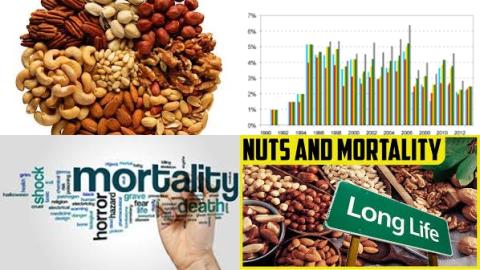
Objectives:
Several previous meta-analyses show a consistent inverse association between nut consumption and all-cause mortality, but the associations with cause-specific mortality remain uncertain. Therefore, this meta-analysis (review article) has been conducted.
Does nut consumption reduce all-cause and cause-specific mortality?
Study design:
This review article included 18 prospective cohort studies with 81,034 deaths.
Results and conclusions:
The investigators found random-effects meta-analysis of 18 studies with 81,034 deaths showed a significant reduced risk of 19% [summary RR = 0.81, 95% CI = 0.78-0.84] for all-cause mortality for high compared with low nut consumption. This significant reduced risk was broadly consistent within subgroups according to various study and population characteristics and within sensitivity analyses that took into account potential confounders.
The investigators found random-effects meta-analysis of 17 studies with 20,381 deaths showed a significant reduced risk of 25% [summary RR = 0.75, 95% CI = 0.71-0.79] for cardiovascular mortality for high compared with low nut consumption. This significant reduced risk was broadly consistent within subgroups according to various study and population characteristics and within sensitivity analyses that took into account potential confounders.
The investigators found random-effects meta-analysis of 14 studies with 10,438 deaths showed a significant reduced risk of 27% [summary RR = 0.73, 95% CI = 0.67-0.80] for coronary heart disease mortality for high compared with low nut consumption. This significant reduced risk was broadly consistent within subgroups according to various study and population characteristics and within sensitivity analyses that took into account potential confounders.
The investigators found random-effects meta-analysis of 13 studies with 4,850 deaths showed a significant reduced risk of 18% [summary RR = 0.82, 95% CI = 0.73-0.91] for stroke mortality for high compared with low nut consumption. This significant reduced risk was broadly consistent within subgroups according to various study and population characteristics and within sensitivity analyses that took into account potential confounders.
The investigators found random-effects meta-analysis of 11 studies with 21,353 deaths showed a significant reduced risk of 13% [summary RR = 0.87, 95% CI = 0.80-0.93] for cancer mortality for high compared with low nut consumption. This significant reduced risk was broadly consistent within subgroups according to various study and population characteristics and within sensitivity analyses that took into account potential confounders.
The investigators found peanut (5 studies) and tree nut (3 studies) consumption were similarly associated with mortality risks.
The investigators found dose-response analyses suggested evidence for nonlinear associations between nut consumption and mortality [p-nonlinearity 0.001 for all outcomes except cancer mortality], with mortality risk levelling off at the consumption of about 3 servings per week (12g/day).
The investigators concluded that nut consumption is associated with reduced all-cause and cause-specific mortality, with the strongest reduction for coronary heart disease (CHD) mortality. Both tree nuts and peanuts lower mortality and most of the survival benefits could be achieved at a relative low level of nut consumption (up to 12g/day).
Original title:
Nut consumption in relation to all-cause and cause-specific mortality: a meta-analysis 18 prospective studies by Chen GC, Zhang R, [...], Qin LQ.
Link:
https://www.ncbi.nlm.nih.gov/pubmed/28875220
Additional information of El Mondo:
Find more information/studies on nut consumption, cancer, cardiovascular disease and stroke right here.